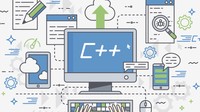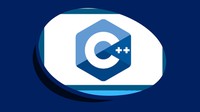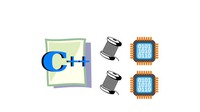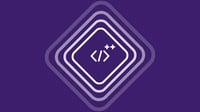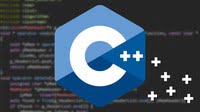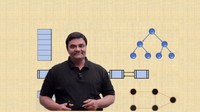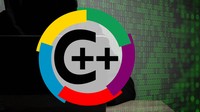
In this article, you can find C++ online courses.
C++ is a general-purpose programming language created by Bjarne Stroustrup as an extension of the C programming language, or “C with Classes”. The language has expanded significantly over time, and modern C++ now has object-oriented, generic, and functional features in addition to facilities for low-level memory manipulation. It is almost always implemented as a compiled language, and many vendors provide C++ compilers, including the Free Software Foundation, LLVM, Microsoft, Intel, Oracle, and IBM, so it is available on many platforms.
C++ was designed with an orientation toward systems programming and embedded, resource-constrained software and large systems, with performance, efficiency, and flexibility of use as its design highlights. C++ has also been found useful in many other contexts, with key strengths being software infrastructure and resource-constrained applications,including desktop applications, video games, servers (e.g. e-commerce, web search, or databases), and performance-critical applications (e.g. telephone switches or space probes).
C++ is standardized by the International Organization for Standardization (ISO), with the latest standard version ratified and published by ISO in December 2020 as ISO/IEC 14882:2020 (informally known as C++20). The C++ programming language was initially standardized in 1998 as ISO/IEC 14882:1998, which was then amended by the C++03, C++11, C++14, and C++17 standards. The current C++20 standard supersedes these with new features and an enlarged standard library. Before the initial standardization in 1998, C++ was developed by Danish computer scientist Bjarne Stroustrup at Bell Labs since 1979 as an extension of the C language; he wanted an efficient and flexible language similar to C that also provided high-level features for program organization. Since 2012, C++ has been on a three-year release schedule with C++23 as the next planned standard.
Below we present 15 C++ courses for everyone
Complete C++ Programming Course with OOP’s Concept
Kunal Gupta via Udemy
This Course is 33 hours content made for people who don’t have any knowledge about programming & want to get started with C++ from scratch in 2021. Topics to be covered will be from Basics – Datatypes and Variables ,Operators ,Conditional Statements, Loops, Recursion ,Arrays, Pointers, Dynamic Memory Allocations Object Oriented Programming, Inheritance, Types of Inheritance ,Static Members , Linked List, Stacks, Queues etc. So, you’ve heard a lot about C++, but you don’t know how to get started? Then this course is exactly what you need! This course assumes no previous coding experience . It doesn’t matter if you have never written any programs or you have no idea about programming… After this course all of this will change.
★★★★★(5-star rating)
C++ Programming Bootcamp
Derek Banas via Udemy
Do you want to develop the skills required to solve real world programming problems? This course will turn you into a real C++ programmer that has a complete understanding of everything C++ can do! Most tutorials are just video versions of cheat sheets. This course is different. It teaches you how to solve problems like you will have to do in the real world. It does that by making you solve ever increasingly complex problems. Don’t worry. I will be there to help along the way. I work through the solutions and also provide heavily commented code and quizzes that will turn you into a C++ Master!This Course will Grow Every Month with New Videos on Algorithms, Data Structures, Design Patterns, Object Oriented Design and More. You’ll Master other Concepts like : Pointers, Threads, Malloc, Iterators and More.
★★★★★(5-star rating)
Quant Finance Essentials using Python C++ & MATLAB
Dr. Spyros Giannelos via Udemy
To buy this course at the smallest possible price and not at the price that Udemy has set , use the promo code below at CheckOut:775385C92EB2C7E0B1AF. We are looking at some fundamental coding tutorials especially for those aiming for a Quant career in Finance since these are topics that frequently come up. Since these topics come up often, we are looking at them, not through theory, but through practice. Specifically, frequently ignored topics are addressed in this course. We avoid theory and jump straight into application. And, essentially, we learn by doing. We are using Matlab and C++. Python will be added later (the course is constantly being upgraded). Probability quizzes are based on understanding what probability is. And how it can be calculated in pratice. The probabilities are calculated in a simple way and – most of all – intuition comes first.
★★★★★(5-star rating)
Scientific Computing in C++
Dr. Okan Koeksal via Udemy
C++ is an excellent programming language which is extremely well–suited for scientific computing. I do not start from scratch, so it is good if you have some experience with C++. However, I’ll try to introduce fundamental programming concepts (vector & boolean functions, arrays etc.) which are needed to understand and solve the discussed coding problems. In particular, concepts needed to understand object–oriented programming like inheritance, static members, virtual functions and polymorphism will be explained in detail. So don’t panic :–). As a starter, we’ll take a look at some basic algorithms such as linear & binary search. Couple tutorials down the road, we’ll take a look at more advanced sorting algorithms like bubble & heapsort algorithms. Before heading towards the heart of C++, we start with coding some small programs such as degree to radian and binary to decimal number converter in order to internalize the required programming concepts.
★★★★★(5-star rating)
Introduction to Object Oriented Programming in C++
Harshit Jain via Udemy
This course is designed to be slow–paced, simple and rich in demystifying the question: What really is an object in computer programming? These few lectures serve as a crucial foundation for OOP (Object Oriented Programming). If you’ve ever written a C++ class before and ran the program but didn’t quite understand what’s going on behind the scenes, this course is for you. You will understand the difference between a class, and an object. You’ll know how objects are constructed and what exactly happens when the program is run. We’ll also go over important OOP techniques such as inheritance and polymorphism.
★★★★★(5-star rating)
C++ OOP : Object Oriented Programming for C++ Projects
Suresh Kumar Srivastava via Udemy
This C++ OOP : Object Oriented C++ Programming tutorial explains the Object Oriented features of C++ programming in step–wise manner. All the topics have been explained in simple way. You will also see the demonstration of source code implementation for each topic. This course will improve the C++ programming skills of developers who have basic understanding of C++. You will learn Object Oriented features of C++ programming which will help in providing efficient solution for software projects.
★★★★★(5-star rating)
Mastering C++ Programming – From Zero to Hero
Himayatullah Sharief via Udemy
This course fully covers from classical C++ to Modern C++ style of creating object Oriented Programs from scratch to advance level in a step–by–step approach. The course teaches in detail the latest concepts introduced in C++11, C++14 and C++17. The object oriented programming concepts are covered in detail such that you will learn all the concepts including classes, objects, Data Abstraction, Data Encapsulation, Inheritance, polymorphism (including Operator overloading and Function Overloading). The main focus of the course apart from Fundamentals of programming and Object Oriented Programming is on Templates(including Function and Class Templates) , which is a building block to understand STL implementation. And standard template library is explored to maximum extent in detail along with the almost all the concepts from the latest versions of C++.
★★★★★(5-star rating)
Learn Multithreading with Modern C++
James Raynard via Udemy
An understanding of multithreading is essential to make full use of the capabilities of modern hardware. Modern C++ provides direct support for threads, so it is now possible to write multithreaded programs in C++ which are portable and have well–defined behaviour, without requiring external libraries. This course focuses on the principles of multithreading, using Modern C++. No previous knowledge of multithreading is required but you should be familiar with programming in C++. The course begins by reviewing the features of Modern C++ which are used in this course. If you feel you require a more thorough coverage of Modern C++, you can get this by taking my course Learn Advanced Modern C++ . We then cover the basic concepts of multithreading and learn how to launch threads in C++. We look at the problems which can occur with multiple threads and how to avoid them..
★★★★★(5-star rating)
Learn Multithreading in C++
John Purcell via Udemy
An introduction to multithreading, and to the powerful multithreading features added to C++ in 2011, 2014 and 2017.In this course I’ll break complex multithreading concepts down into simple steps, demonstrating practically, in front of your eyes, how you can make use of multiple threads to accomplish tasks that would be difficult or horribly slow without multithreading.Take your C++ to the next level! Among other things, you’ll learn the following in this course: How to create threads using the thread class or async, How to work with promises, futures and tasks, How to use mutexes and locks to coordinate multiple threads, How to use conditions to signal between threads, How to create blocking queues and thread pools.
★★★★★(5-star rating)
Modern C++ development with bazel, googletest and googlemock
Balaji Ambresh Rajkumar via Udemy
Bazel is a build system from google. C++ is one of the languages that bazel supports. One of the nice things about bazel is, you specify the files and bazel figures out the dependency tree. Bazel is written in skylark (a subset of python) which makes it accessible to a wide audience. The ability to integrate with other libraries and the build performance makes bazel a great choice to use. Googletest is an industry wide accepted solution for unit testing. It’s battle tested across multiple projects at varying scales in the industry. This framework is built along lines of other popular frameworks like junit (following the xunit principles).Googlemock is a framework for stubbing external calls to make your unit tests repeatable in isolation. Looking forward to seeing you in the course.
★★★★★(5-star rating)
Type-Safe Interfaces with Modern C++
Packt Publishing via Udemy
In this course we’ll learn how to write correct, safe, and performant code by making use of C++’s type system. Firstly, we’ll learn about the Standard Library’s “algebraic data types” and how they can increase safety, performance, and readability of your application/library. We’ll then look at function interfaces. As an example, writing a function that takes a string in such a way that it performs optimally with both std::string and const char* seems like a daunting task. It gets even more tricky with functions taking other functions as input. Is it possible to generalize these issues and provide the “perfect” interface?
★★★★★(5-star rating)
Learn C++ Online
David Silver via Udacity
Get hands–on experience by coding five real–world projects. Learn to build a route planner using OpenStreetMap data, write a process monitor for your computer, and implement your own smart pointers. Finally, showcase all your newfound skills by building a multithreaded traffic simulator and coding your own C++ application.
★★★★★(5-star rating)
Detecting Memory Leaks in C/C++ Applications
Umar Lone via Udemy
C++ is a large and complex language, but it gives programmers complete freedom when it comes to management of dynamic memory. This allows the programmers to allocate memory and manipulate it at runtime. That is why C++ is still a favorite language for high performance applications in various domains such as gaming, telecom, finance, aerospace, etc.This course will help you overcome all these problem by leveraging the excellent features that Visual Studio provides. It has a rich set of functions provided by the C/C++ runtime heap library. These functions can help detect memory leaks, overflows, etc. You’ll learn how to use these functions effectively and make your programs bug–free.
★★★★★(5-star rating)
Mastering Data Structures & Algorithms using C and C++
Abdul Bari via Udemy
You may be new to Data Structure or you have already Studied and Implemented Data Structures but still you feel you need to learn more about Data Structure in detail so that it helps you solve challenging problems and used Data Structure efficiently. This 53 hours of course covers each topic in greater details, every topic is covered on Whiteboard which will improve your Problem Solving and Analytical Skills. Every Data Structure is discussed, analysed and implemented with a Practical line–by–line coding.
★★★★★(5-star rating)
C++ Programming Bootcamp – Learn Complete C++ From 0 to 100
Piroz Amin via Udemy
C++ Programming Language is one the fasted and flexible programming languages of all time as well as one of the most widely used programming languages in the world. C++ is one of the rare languages which holds two features that’s Procedural Oriented and object–oriented methodologies. Why you should learn C++ programming? C++ is Currently Everywhere and widely used across the platforms. C++ is one of the most popular languages in the world. It is used by some 4.4 million developers worldwide. C++ Developers hold some of the most high–paying jobs in the industry with an average base pay of $100, 000 per year. If you don’t have programming experience at all or have little background in programming it’s alright. In this course, you will learn the fundamentals of programming languages in general and C++ language in specific.
★★★★★(5-star rating)
.


